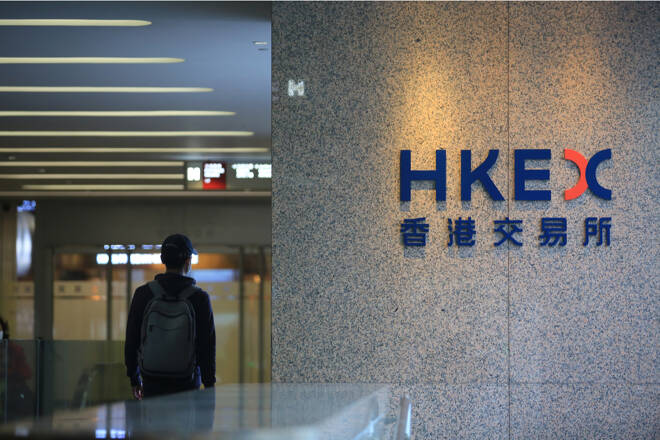Advertisement
Advertisement
Hang Seng Index, ASX 200, Nikkei 225 Index: Navigating the US Treasury Yield Surge
By:
In the wake of Middle East concerns, a murky market forecast prevails for Hang Seng and its peers
Key Insights:
- The Hang Seng Index stumbled on Thursday, leading the broader Asian equity markets into negative territory.
- An uptrend in 10-year US Treasury yields and the Middle East conflict weighed on market risk sentiment.
- The futures point toward another testy Asian session on Friday.
Overview of the Thursday Session
The Hang Seng Index tumbled on Thursday, with the ASX 200 and the Nikkei also suffering heavy losses.
Housing data from the US on Wednesday had a limited impact on the Asian equity markets. However, Fed forward guidance on interest rates pushed 10-year Treasury yields higher, weighing on riskier assets. While bets on a Fed rate hike have eased, the markets anticipate a higher-for-longer interest rate trajectory.
Concerns over an escalation in the Middle East conflict contributed to the negative mood.
On Wednesday, the Nasdaq Composite Index slid by 1.62%. The S&P 500 and Dow ended the session down 1.34% and 0.98%, respectively.
Asian economic indicators failed to change the mood during the Thursday session. Trade data from Japan sent mixed signals. While exports rose, a slump in imports signaled a weak demand environment. Employment figures from Australia also disappointed. An unexpected fall in the participation rate drew interest.
The Friday Session: Powell, Inflation, and the PBoC
US economic indicators from Thursday are unlikely to influence investor sentiment on Friday. Better-than-expected US jobless claims failed to fuel hawkish Fed commentary. On Thursday, Fed Chair Powell eased bets on a Fed interest rate hike. Aligned with recent FOMC member speeches, Powell expected the spike in Treasury yields to subdue pressure on the Fed to hike rates.
However, 10-year US Treasury yields hit a Thursday high of 4.996%, sending the US equity markets into negative territory.
The Dow and S&P 500 fell by 0.75% and 0.85% on Thursday, with the Nasdaq Composite Index declining by 0.96%.
On Friday, inflation figures from Japan and the PBoC will draw interest. Softer-than-expected inflation numbers may support the Nikkei. However, the latest economic indicators from China may allow the PBoC to leave Loan Prime Rates unchanged.
Away from the economic calendar, news updates from the Middle East also need consideration.
In the Futures Markets, the ASX 200 and the Nikkei 225 were down 60 points and 150 points, respectively.
ASX 200
The ASX 200 declined by 1.09% on Thursday. Rising Treasury yields weighed on tech stocks. The S&P/ASX All Technology Index (XTX) slid by 1.47%. Mining stocks and the big four banks ended the session in negative territory.
The Commonwealth Bank of Australia (CBA) fell by 1.62%. Westpac Banking Corp (WBC) and the National Australia Bank (NAB) ended the day down 1.40% and 1.46%. ANZ Group (ANZ) declined by 0.74%
Mining stocks had a negative session. Rio Tinto (RIO) and BHP Group Ltd (BHP) saw losses of 1.65% and 1.42%. Fortescue Metals Group (FMG) fell by 0.18%, while Newcrest Mining (NCM) gained 0.04%.
Oil stocks had a mixed session. Woodside Energy Group (WDS) fell by 0.87%, while Santos Ltd (STO) ended the day flat.
Hang Seng Index
On Thursday, the Hang Seng Index slid by 2.46%. The real estate sector continued to pressure the Hang Seng Index. Fear of a Country Garden (HK:2007) default left the Hang Seng Mainland Property Index (HSMPI) down 2.49%.
Alibaba Group Holding Ltd (HK:9988) and Tencent Holdings Ltd (HK:0700) slid by 2.82% and 2.93%.
Bank stocks also suffered heavy losses. China Construction Bank (HK:0939) and the Industrial and Commercial Bank of China (HK:1398) declined by 2.15% and 2.32%. HSBC Holdings PLC (HK:0005) fell by 2.41 %.
Nikkei 225
(Graph for reference purposes only)
The Nikkei ended the Wednesday session down 1.91%.
Bank stocks Sumitomo Mitsui Financial Group (8316) and Mitsubishi UFJ Financial Group (8306) ended the day down 1.76% and 1.43%. However, the main components of the Nikkei had another mixed session.
Tokyo Electron Limited (8035) tumbled by 4.70%, with Fast Retailing Co (9983) sliding by 2.69%. SoftBank Group Corp. (9984) and Sony Corp. (6758) saw losses of 1.01% and 1.02%, respectively.
KDDI Corp. (9433) bucked the trend, gaining 0.16%.
For upcoming economic events, check out our economic calendar.
About the Author
Bob Masonauthor
With over 28 years of experience in the financial industry, Bob has worked with various global rating agencies and multinational banks. Currently he is covering currencies, commodities, alternative asset classes and global equities, focusing mostly on European and Asian markets.
Advertisement
